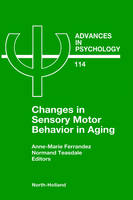
Changes in Sensory Motor Behavior in Aging
North-Holland (Verlag)
978-0-444-82101-0 (ISBN)
- Titel ist leider vergriffen;
keine Neuauflage - Artikel merken
Recently, studies on aging processes and age-related changes in behavior have been expanding considerably, probably due to the dramatic changes observed in the demographics. This increase in the overall age and proportion of elderly people has heightened the severity of problems associated with the safety and well-being of elderly persons in everyday life. Many researchers working on motor control have thus focused more intensely on the effects of age on motor control. This new avenue of research has led to programs for alleviating or delaying the specific sensory-motor limitations encountered by the elderly (e.g. falls) in an attempt to make the elderly more autonomous.The aggregation of studies from different perspectives is often fascinating, especially when the same field can serve as a common ground between researchers. Nearly all contributors to this book work on sensory-motor aging; they represent a large range of affiliations and backgrounds including psychology, neurobiology, cognitive sciences, kinesiology, neuropsychology, neuropharmacology, motor performance, physical therapy, exercise science, and human development. Addressing age-related behavioral changes can also furnish some crucial reflections in the debate about motor coordination: aging is the product of both maturational and environmental processes, and studies on aging must determine how the intricate interrelationships between these processes evolve. The study of aging makes it possible to determine how compensatory mechanisms, operating on different subsystems and each aging at its own rate, compensate for biological degenerations and changing external demands. This volume will contribute to demonstrating that the study of the aging process raises important theoretical questions.
Age-related slowing in movement parameterization studies: Not what you think (P.C. Amrhein). Control of simple arm movements in the elderly (S.H. Brown). Slowness, variability, and modulations of gait in healthy elderly (A.-M. Ferrandez, M. Durup, F. Farioli). Aging and coordination from the dynamic pattern perspective (L.S. Greene, H.G. Williams). Posture control and muscle proprioception in the elderly (L. Hay). Posture and gait in healthy elderly individuals and survivors of stroke (K.M. Hill, A.A. Vandervoort). Tests in rodents for assessing sensorimotor performance during aging (B. Jänicke, H. Coper). Attentional demands for walking: Age-related changes (Y. Lajoie, N. Teasdale, C. Bard, M. Fleury). Visual control of obstacle avoidance during locomotion: Strategies in young children, young and older adults (A.E. Patla, S.D. Prentice, L.T. Gobbi). Constraints on prehension: A framework for studying the effects of aging (E.A. Roy, P.L. Weir, J.L. Leavitt). Age, perceived health, and specific and nonspecific measures of processing speed (T.A. Salthouse, J.L. Earles).
| Erscheint lt. Verlag | 11.12.1995 |
|---|---|
| Reihe/Serie | Advances in Psychology |
| Sprache | englisch |
| Gewicht | 770 g |
| Themenwelt | Geisteswissenschaften ► Psychologie ► Biopsychologie / Neurowissenschaften |
| ISBN-10 | 0-444-82101-5 / 0444821015 |
| ISBN-13 | 978-0-444-82101-0 / 9780444821010 |
| Zustand | Neuware |
| Haben Sie eine Frage zum Produkt? |
aus dem Bereich


